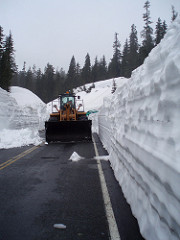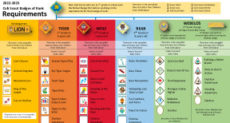 You’ve probably heard the term helicopter parents. These are parents who seem to hover above their children, manipulating them like marionettes and steering them around life’s obstacles. Afraid to see their children fail, they try to push them to make the right decisions, acting as managers and spokesmen and try to erase any uncertainty. We’ve written about the subject several times in the context of highly organized activity schedules, staying out of the Scouts’ way, and mentoring and guiding our Scouts, rather than directing and managing them.
You’ve probably heard the term helicopter parents. These are parents who seem to hover above their children, manipulating them like marionettes and steering them around life’s obstacles. Afraid to see their children fail, they try to push them to make the right decisions, acting as managers and spokesmen and try to erase any uncertainty. We’ve written about the subject several times in the context of highly organized activity schedules, staying out of the Scouts’ way, and mentoring and guiding our Scouts, rather than directing and managing them.
I heard another term a couple weeks ago listening to a radio interview with a local parenting expert.  In a discussion on raising resilient kids and teaching them the coping skills they’ll need later in life, Nancy Serlin described to WEMU’s Lisa Barry the phenomenon of snowplow parents.
The name says it all, and I’m sure we know parents that match the description. You may even be guilty of it yourself. Snowplow parents don’t just hover above and manipulate their kids – they go ahead of them, removing the obstacles that could cause a setback or impediment, hoping to allow their children to cruise right through life.
It turns out that much has been written about the snowplow parent phenomenon, along with its result, so-called teacup children – kids who have traveled through their young lives free of bumps and roadblocks and insulated from setbacks and adversity so that they are unable to deal with them as adults. Some examples of snowplow parenting include:
- having a child moved to another class so she’ll be with her friends
- asking a coach to give their son more playing time or a better position
- lobbying a teacher (or even a college professor) to raise their child’s grade, or worse – hacking into the school computer network and doing it themselves (it’s been done!)
- doing research, building models for class projects or even writing term papers for them
An opinion piece in The Washington Post summarizes the phenomenon and gives a good description of the trait and the damage it can cause.
How does this tie in to Scouting? There are very likely a few snowplow parents in your troop or pack. In Cub Scouting, parents are more involved in the pack and den programs, but the age-progressive nature of the activities is intended to hand more and more responsibility to the youth as they grow older. In Boy Scouts, the youth members are expected to plan, prepare and carry out the troop’s activities, and each Scout is responsible for his own advancement and participation. This goes awry when parents take too active a role in their child’s Scouting experience.
As Scouters, we need to be alert to the signs that parents are trying to “snowplow” their child’s Scouting pathway. I’m sure you’ve seen situations like these:
- packing their son’s gear for a campout, or driving out to camp to bring an item he forgot
- building, paint-booth finishing and wind-tunnel testing their son’s Pinewood Derby car (to the point that the boy doesn’t even recognize his own car)
- bugging the Scoutmaster because their child hasn’t completed advancement items
- registering to counsel merit badges just so they can work on them with their sons
- arranging for an Eagle Scout service project, directing the work and even writing the report for them
It’s a good thing parents are excluded from boards of review, or they’d be there trying to snowplow the committee as well.
What can you do? Be watching for signs of snowplow parents. Gently but firmly explain why Scouting is the way it is – youth-led – and the benefits of letting the Scouts learn by trying, safely failing, and trying again. Do your best to insulate the parents’ influence at troop and patrol events. During Scoutmaster conferences, boards of review and informal discussions, try to ascertain that the Scout actually experienced growth as a result of the things he did, or if it seems like there’s too much parental influence.
It has been said that as parents we are not raising children – we’re raising adults. As we all know from experience, life is not an easy ride. We owe it to our kids to prepare them for what lies ahead. Smoothing the road for them does nothing to help them learn to dodge life’s future potholes.
This post first appeared on Bobwhite Blather.



